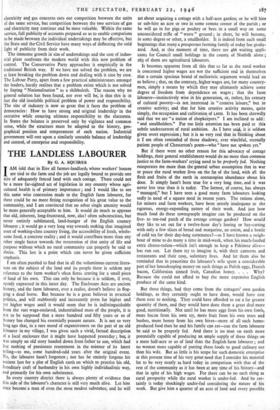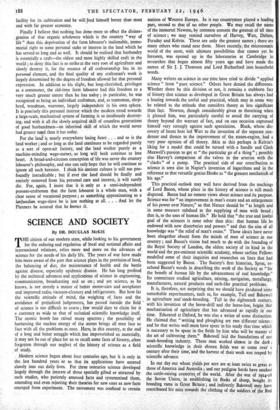THE LANDLESS LABOURER
By G. A. SQUIRES AM told that in Eire all farmer-landlords whose workers' houses I are tied to the farm and the job are legally bound to provide one acre of adequately fenced land, with each cottage. There could not be a more far-sighted act of legislation in any country whose agri- cultural, health is of primary importance ; and I would like to see this same wise concession made to the English farm labourer, for there could be no more fitting recognition of his great value to the community, and I am convinced that no other single amenity would be more generally acceptable to him. It would do much to appease that old, inherent, long-frustrated, now, alas! often subconscious, but never entirely sublimated, land-hunger of the English country labourer ; it would go a very long way towards making that imagined asset of working-class country living, the accessibility of fresh, whole- some food, a- concrete reality ; and it would contribute more than any other single factor towards the restoration of that unity of life and purpose without which no rural community can properly be said to thrive. This last is a point which can never be given sufficient emphasis.
I am often puzzled to find that in all the voluminous current litera- ture on the subject of the land and its people there is seldom any reference to the farm worker's often fierce craving for a small piece of land of his own. This can only be because it is seldom, if ever, openly expressed in this latter day. The Enclosure Acts are ancient history, and the farm labourer, ever a realist, doesn't believe in flog- ging' a dead horse. But because he is a great believer in practical politics, and will stubbornly and incessantly press for higher and yet higher wages until it would seem that he is indistinguishable from the vast wage-enslaved, industrialised mass of the people, it is not to be supposed that a mere hundred and fifty years- or so of history has changed his essentially peasant nature. It is not so very long ago that, in a rare mood of expansiveness on the part of an old labourer in my village, I was given such a vivid, factual description of a local enclosure that it might have happened yesterday ; but, it was simply an old story handed doVin from father-to son, which had lost nothing of passionate resentment in the manner of its latest telling—to me, some hundred-odd years after the original event. No, the labourer hasn't forgotten ; nor has he entirely forgone his ancient lust for a plot of English earth on which to practise his old, hereditary craft of husbandry in his own highly individualistic way, and primarily for his own subsistence.
In every country district there is always plenty of evidence that this side of the labourer's character is still very much alive. Let him once become a man of even- the most modest substance, and he will set about acquiring a cottage with a half-acre garden; or he will hire or sub-hire an acre or two in some remote corner of the parish ; or he will go in for pigs or poultry or bees in a small way on some unconsidered trifle of " waste " ground ; in short, he will become, in some degree or other, a smallholder. It is indeed from such small beginnings that many a prosperous farming family of today has gradu- ated. And, at this moment of time, there are 466 waiting appli- cants for Council small holdings in the county of Norfolk alone ; 265 of them are agricultural labourers.
It becomes apparent from all this that so far as the rural worker is concerned higher wages are not the sufficient end in themselves that a certain specious brand of melioristic argument would lead us to believe ; that, on the contrary, higher wages are, for many country- men, simply a means by which they may ultimately achieve some degree of freedom from dependence on wages ; that the farm labourer—instinctively wise in his generation, or, rather, his century of cultural poverty—is not interested in " creative leisure," but in creative activity; and that for him creative activity means, quite simply, the occupation and cultivation of LAND. It has been shrewdly said that we are "a nation of shopkeepers." I am inclined to add : " and smallholders." Far too little attention has been paid to this subtle undercurrent of rural ambition. As I have said, it is seldom given overt expression ; but it is so very real that in thinking about it I am often reminded of those shadowy, ever Watchful, eternally patient people of C.hesterton's poem—who " have not spoken yet."
But if there were no other reason for this advocacy of cottage holdings, their general establishment would do no more than common justice to the farm-workers' crying need to be properly fed. Nothing exasperates me more than the general urban assumption that in war or peace the rural worker lives on the fat of the land, with all the flesh and fruits of the earth in cornucopian abundance about his door. It simply hasn't been true for a very long time, and it was never less true than it is today. The farmer, of course, has always "managed," but I have seen a good many farm labourers looking sadly in need of a square meal in recent years. The rations alone, for miners and farm workers, have been utterly inadequate to the rigorous, energy-expending nature of their work. And just how much food do these townspeople imagine can be produced on the five- to ten-rod patch of the average cottage garden? How would they like to set out for a twelve-hour day's hoeing or hay-carting with only a few slices of bread and margarine, an onion, and a bottle of cold tea for their day-long sustenance?—as I have known a neigh- bour of mine to do many a time in mid-week, when his much-lauded extra cheese-ration—which isn't enough to keep a Pekinese alive— has run out. Let them try to imagine it, with their canteens and restaurants and their cosy, sedentary lives. And let them also be reminded that in peacetime the labourer's wife spent a considerable part of her housekeeping money on such things as Polish eggs, Danish bacon, Californian tinned fruit, Canadian honey. . . . Why? Because she could not afford to buy the more expensive English produce of the same kind.
But these things, had they come from the cottagers' own garden holdings, as they certainly ought to have done, would have cost them next to nothing. They could have afforded to eat a far greater quantity of them, and they would have done them a great deal more goqd, nutritionally. Not until he has more eggs from his own fowls, more bacon from his own sty, more fruit from his own trees and bushes, more honey from his own hives—more of all such home- produced food than he and his family can eat—can the farm labourer be said to be properly fed. And there is no man on earth more potentially capable of producing an ample supply of these things on a mere half-acre or so of land than the English farm labourer ; and no woman more capable of putting these foods to good culinary use than his wife. But so little is his scope for such domestic enterprise at this present time of his very great need that I consider his material lot to be very nearly as hard today in comparison with that of the rest of the community as it has been at any time of his history—and that in spite of his high wages. For there can be no such thing as rural prosperity while the rural worker is under-fed. And he cer- tainly is today shockingly under-fed considering the nature of his work. But give him a quarter of an acre of land and every possible.
facility for its. cultivation and he will feed himself better than most and with far greater economy.
Finally I believe that nothing has done more to effect the disinte- gration of that organic wholeness which is the country " way of life " than this deprivation of the farm labourer's inalienable, imme- morial right to some personal stake or interest in the land which he has served so long and so well. It should be realised that husbandry is essentially a craft—the oldest and most highly skilled craft in the world ; to deny this fact is to strike at the very root of agriculture and slowly destroy it, for the essence of all craftsmanship lies in its personal element, and the final quality of any craftsman's work is largely determined by the degree of freedom allowed for that personal expression. In addition to his slight, but long-cherished, privileges as a commoner, the old-time farm labourer had this freedom to a very much greater extent than he has today ; in particular, he was recognised as being an individual craftsman, and, as teamsman, shep- herd, woodman, warrener, largely independent in his own sphere. It is precisely this personal interest which the modern trend towards a large-scale, mechanised system of farming is so insidiously destroy- ing, and with it all the slowly acquired skill of countless generations of good husbandmen—an inherited skill of which the world never had greater need than it has today.
For the land is nearly everywhere losing heart . . . and so is the land worker ; and so long as the land continues to be regarded purely as a sort of open-air factory, and the land worker purely as a machine-minding wage-earner, so long will both continue to lose heart. A bread-and-circuses conception of life was never the country labourer's philosophy, and one can only hope that he will continue to ignore all such heresies. I think his ancient culture is still too pro- foundly ineradicable ; but if ever the land should be finally and entirely removed from his personal care and interest, it will surely die. For, again, I insist that it is only as a semi-independent peasant-craftsman that the farm labourer is a whole man, with a clear sense of vocational purpose ; as something approximating to a latifundian wage-slave he is just nothing at all. . . . And let the Planners be assured that he knows it.































 Previous page
Previous page